The most potent weapon in the hands of the oppressor is the mind of the oppressed.
– Stephen Biko
The Sun Never Says
Even after all this time, the Sun never says to the Earth, “You owe me.” Look what happens with a love like that? It lights the whole sky.
-Hafiz
It is forbidden to walk on the grass. It is not forbidden to fly over the grass.
– Augusto Boal
I spent the better part of July building a new bike. I love the bike. But we’re not IN love yet…
The bike I’ve been riding for nearly five years, Parvati, has been a faithful companion. Together, we have accomplished many cycling goals, to say nothing of hours (HOURS!) of meditative, communal pedaling through Nature’s wonder, galore! Parvati, named after the Hindu goddess, wife of Lord Shiva, was dubbed so after careful thought and prayerful intention.
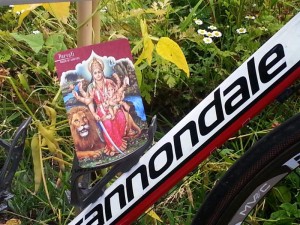
Divinely named…
She is red, a color to be reckoned with (and one I’ve never had the confidence to wear). She is made of carbon and came with fancy wheels that are designed to go f-a-s-t. When I first began riding Parvati, I felt out of my league, like a wrangler tasked to train her Hot Rod to, “heel,” and to respect who was the true Alpha in the relationship. Over time, we became friends and team-mates, looking out for one another on each endeavor.
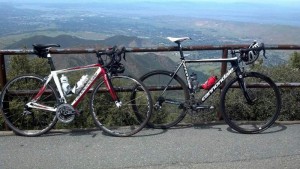
Parvati (left) and Friend, Mt Diablo summit
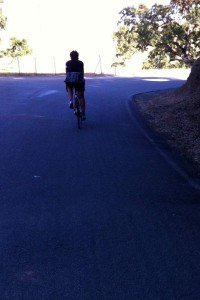
Parvati and I, riding up Mt Hamilton
Earlier this year, after a back injury, it became clear that, despite all our accomplishments, Parvati was a touch too small for me. For the riding I want to do (and hopefully for many years to come), a different bike was necessary. I felt instantly confused and ambivalent. Unlike other negotiations she and I had been forced to work out on the road (mechanical issues, directional challenges, headwinds and long miles when Parvati forged on, nudging her weary traveler), this was something we couldn’t fix. Parvati would need to find a new home.
Parvati stables in a locked shed in my backyard. After any ride, when putting her away, I thank her, often kissing her, but always touching her stem and expressing my gratitude for keeping me safe, for showing me a fun, beautiful ride, and for partnering with me to face new challenges. Now, amidst the immense gratitude I felt for Parvati, I felt guilt.
….And then the *new* bike frame arrived (custom measurements, specially-ordered, totally-over-the-top-intimidating). I made a point of leaning Parvati up against the newly-shipped box. I wanted her to get used to the idea.

‘Gotta admit, It IS a beau-tee!
About that time, Valentino came over. Valentino, a fine cyclist, good friend, bike-building mentor and my sweetheart, walked through the door and smiled at the bikes’ configuration, “Great idea! ‘Parvati, tell the new one all your secrets!’” “OHHHH! Is THAT what’s happening?” I exclaimed. “I was just feeling so sad for Parvati….”
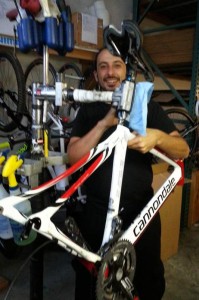
Valentino, showing Parvati some love in the transition
“No waaaay,” Valentino corrected. “Right now, she’s passing along her secrets and coaching the new bike, ‘She’s not super confident on technical descents; she’ll want to take those nice and easy. She’s ridiculously strong, but doesn’t tends to forget, so help to remind her…’ etc. etc.”
Huh! I hadn’t thought of that. But I wished I had! And I began holding this new reality, empowering Parvati to be the coach she had always been, as the one who would happily bid me Adieu so she could take on her next case. Of course. Why should it be otherwise?
And that really IS the question. Why did my mind and heart first go to the place of guilt and sadness? What have I been taught, or where did I subscribe to thinking that moving on equals diminishing what has been? In the musical, Annie, Daddy Warbucks says, “I’ve always believed one thing, you don’t have to be nice to the people you meet on the way up, if you’re not coming back down again.” In Capitalist culture, there is an assumption that when I discard one widget, I am doing so to make room for the next one, bigger and better. As consumers, the marketplace encourages our proud (thankless?) declarations of, “I’m done with this!” Nevermind where it will go, what I’m to do it with it now.
Has this ideology insidiously informed the way we approach our non-widget interactions, as well? Granted, in the world of bike consumption, Parvati isn’t Parvati. She is a 2008 Cannondale Synapse. In the relational world, though – the world that is SO much bigger (and sooooooo much better) than the limitations of an economic system – Parvati (widget or not) has been a relationship. She has been teacher and guide. And this is true of so many other life practices, as well, that unconsciously might sneakily, oppressively be subsumed in the practices of consuming.
But here’s the thing: we’re not ONLY consumers. Indications all over the place show us that humans feel overwhelmed by the weight and pressure of consuming, especially when there is no affirming plan or process for proper down-cycling or burial. Consumers and widgets go together in transactions (and often really poor discard planning), but I don’t want to bring this mentality to infuse the rest of my one, crazy-miraculous experience of life.
And so, until part two…
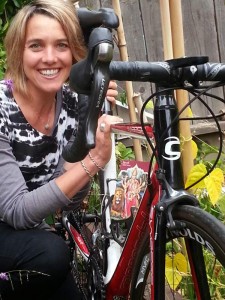
Me and my beloved teacher, just after our final ride